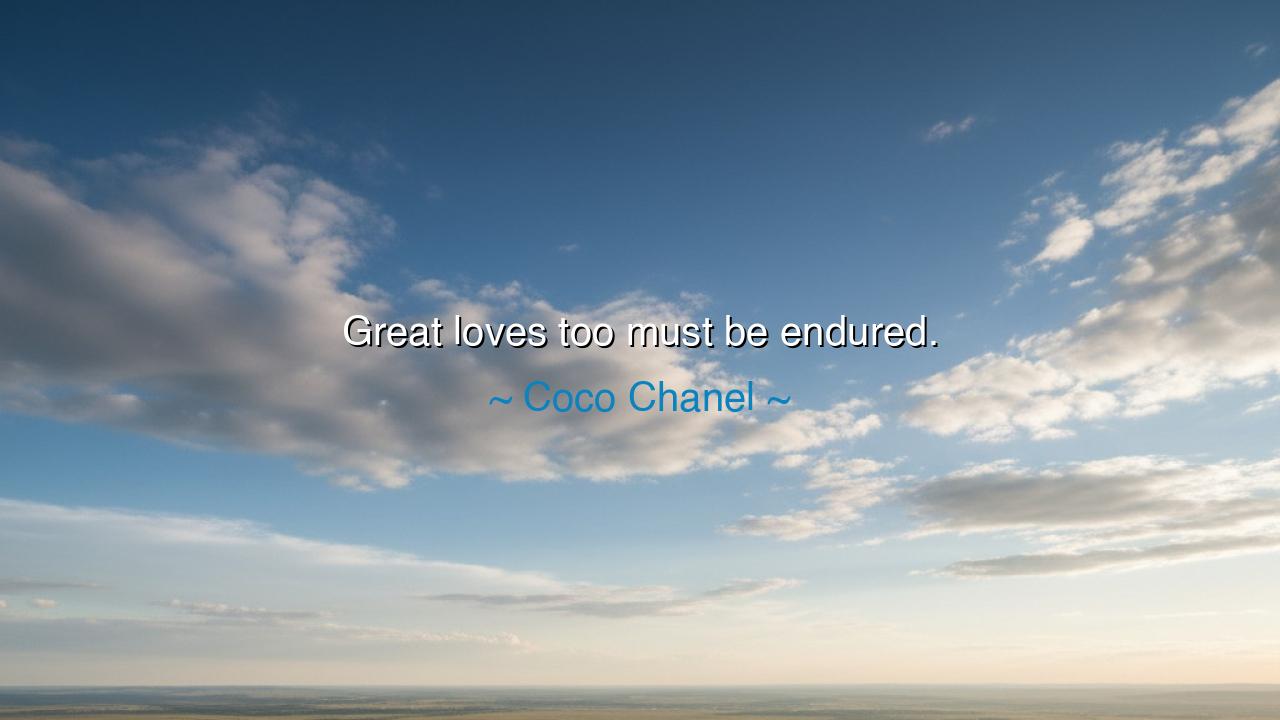
Great loves too must be endured.






When Coco Chanel declared, “Great loves too must be endured,” she revealed a truth as ancient as the human heart itself — that love, in its highest form, is not a gentle dream but a trial of endurance. Her words do not speak of fleeting affection or momentary passion, but of that deeper, rarer bond that demands patience, sacrifice, and strength. Chanel, who lived a life marked by brilliance and solitude, understood that even the most luminous love carries within it the shadow of suffering. To endure love is to stand firm when beauty fades, when joy is pierced by loss, and when the fire that once burned bright must be tended through storm and silence.
The origin of this quote lies in the personal and emotional landscape of Chanel’s own life. Though she became a symbol of independence and elegance, her story was laced with longing and heartbreak. Her greatest love was Arthur “Boy” Capel, the English polo player who helped her rise from obscurity to success. Their affair was fierce and fateful — a meeting of souls who shared ambition, wit, and fire. Yet it was also marked by pain, for Capel was bound by another life, and their union could not last. When he died in a tragic car accident in 1919, Chanel said, “It is perhaps the only time I have truly loved.” Out of that grief, she built her empire. Out of that endurance, she shaped her art. Thus, her words — “Great loves too must be endured” — are not cold philosophy, but the distillation of lived passion and loss.
In her phrase lies a profound paradox: that what is great in love is not its ease, but its weight — the willingness to bear the cost of connection. For love, when it is real, strips away illusion. It tests not only the heart’s capacity for joy, but its capacity for forgiveness, patience, and persistence. The ancients knew this well. The poet Ovid, in his Ars Amatoria, wrote that love is both delight and labor, a flame that must be watched lest it consume or fade. And in myth, even the gods suffered for love — Orpheus braving the underworld for Eurydice, only to lose her once more; Penelope enduring decades of solitude for Odysseus. Chanel’s insight stands among these eternal truths: that to love greatly is to accept the inevitable pain that comes with depth.
Yet endurance in love is not only about grief or waiting; it is also the art of constancy. In a world where affection is often measured by pleasure, Chanel’s words remind us that love’s truest form is found in perseverance — in the quiet decision to remain, to care, to continue even when emotion falters. For all great loves, whether romantic or familial, pass through seasons: the spring of passion, the summer of fulfillment, the autumn of weariness, and the winter of endurance. Those who mistake the fading of passion for the end of love do not yet understand that enduring love is a conscious act, not a feeling sustained by chance.
There is power, too, in Chanel’s choice of the word “endured.” It suggests that love, like art, demands discipline — that beauty, even in the heart, must be forged through struggle. Just as the sculptor endures the hardness of marble to reveal form, the lover must endure the rough edges of another soul to uncover understanding. The endurance she speaks of is not stoic suffering, but devotion refined through time. To endure a great love is to stand witness to its transformations — to accept that love will both wound and heal, diminish and deepen, yet remain the axis upon which life turns.
Consider also the story of Frida Kahlo and Diego Rivera, whose love was tempestuous, filled with betrayal and reconciliation, yet unbroken by time. Their relationship was a crucible of creation and pain. Kahlo once wrote, “I suffered two accidents in my life. One was the bus crash, the other was Diego.” And yet she loved him still, fiercely, eternally. Her art, like Chanel’s fashion, was born of that endurance — proof that love, when endured, becomes a force of transformation, turning suffering into beauty and impermanence into art. Chanel and Kahlo both understood that to love deeply is to risk destruction — and yet to endure that love is to be reborn stronger.
So, my child, remember this truth: love is not a garden to stroll through, but a mountain to climb. It will wound you, test you, and demand your patience. But if you endure — with grace, honesty, and faith — you will find within it something unbreakable. Do not flee when love becomes difficult; for the weight you carry is the proof of its greatness. Let love refine you, not ruin you. Let it teach you, not defeat you. For as Coco Chanel herself learned, the loves that matter most do not come to make life easy — they come to make it meaningful. And in the end, those who endure love, as she did, do not merely survive it — they are made eternal by it.






AAdministratorAdministrator
Welcome, honored guests. Please leave a comment, we will respond soon